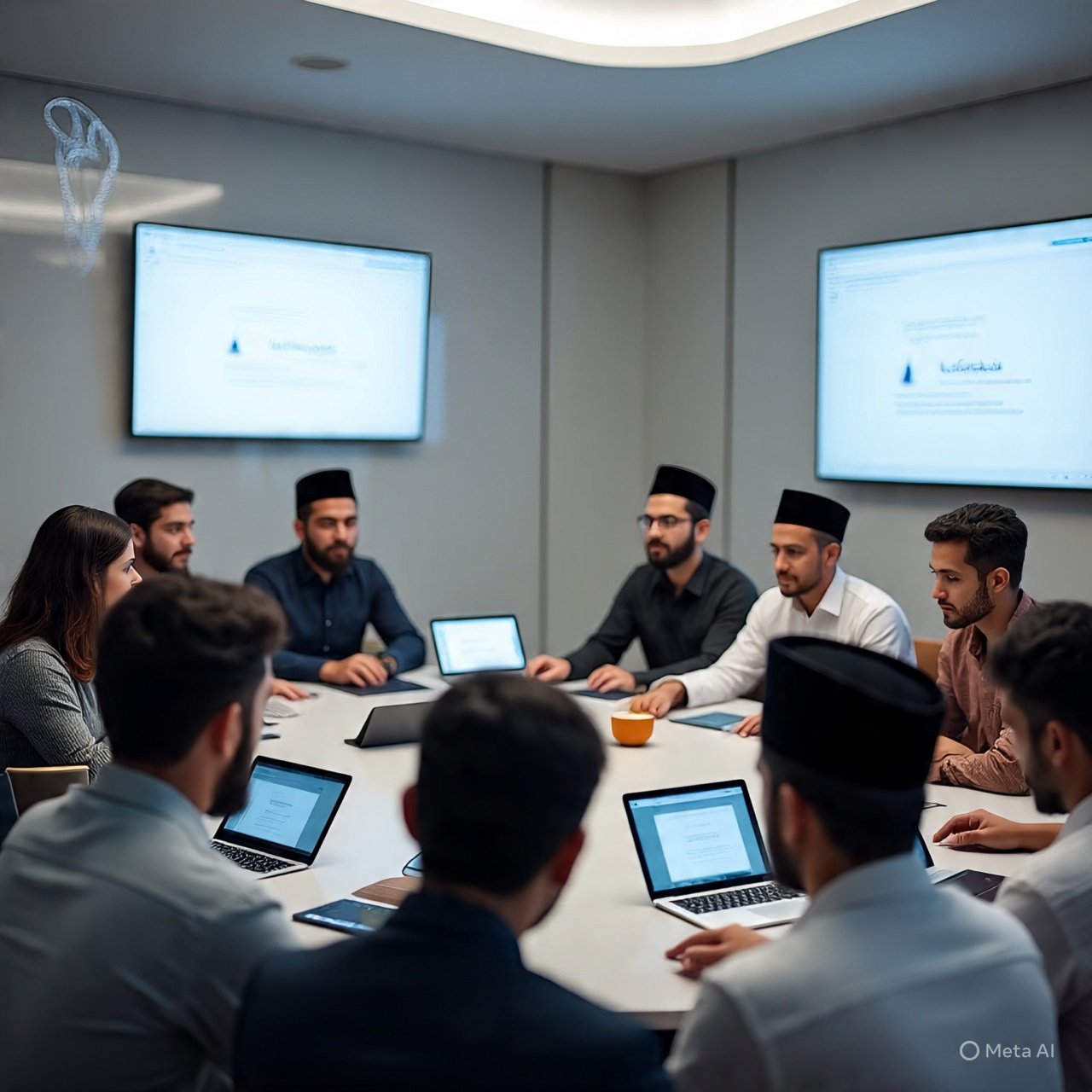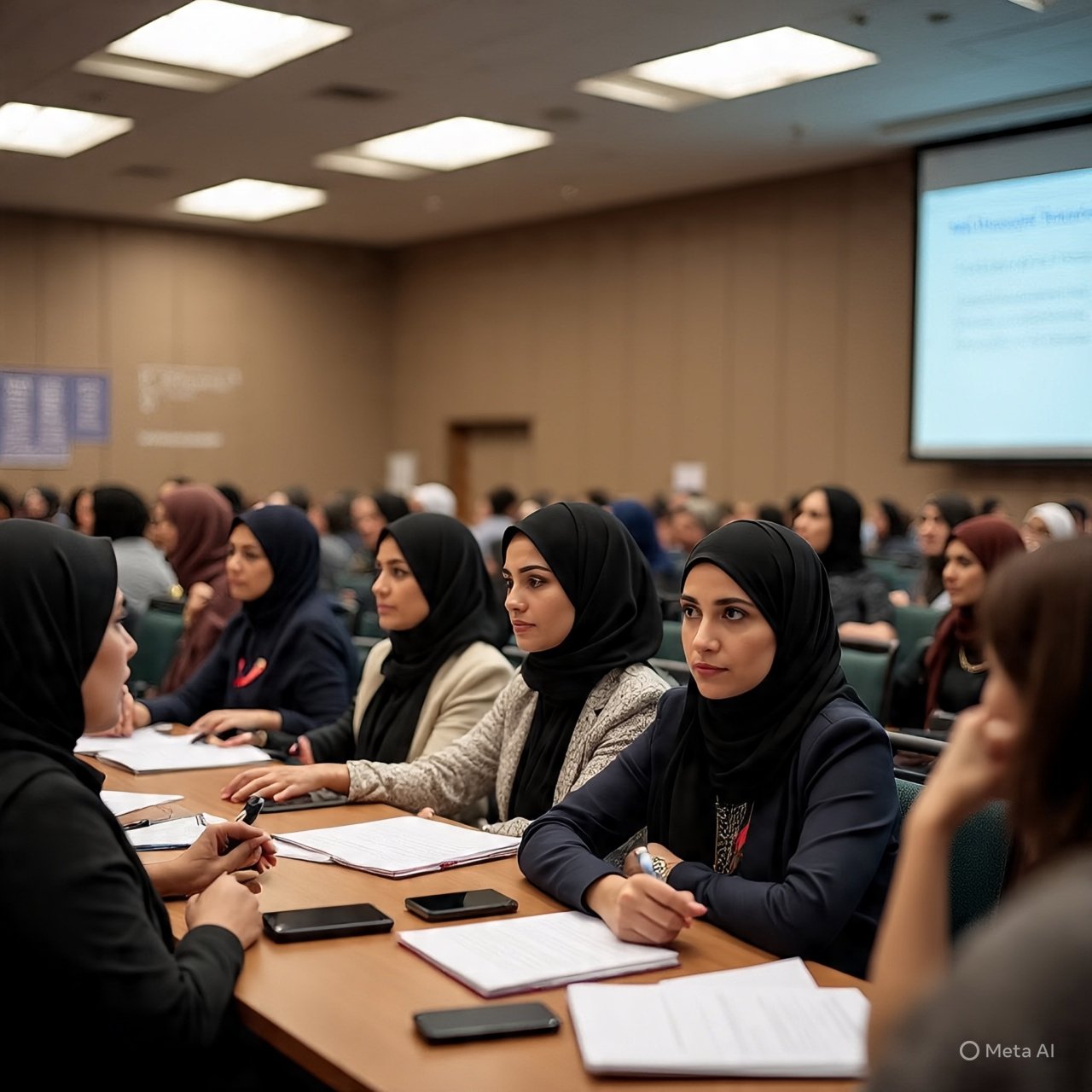🌅 Digital Renaissance: Islamic Civilization in the Technological Era
A New Dawn – When Digital Characters Harmonize with Quranic Verses
Introduction: The Dawn of a New Era
At every turning point in human history, civilizations have told their stories and established their influence through the dominant media and knowledge structures of their era. In the Age of Enlightenment, it was the printed book; in the 20th century, it was radio and television; and in the early 21st century, it became the internet and social media. Now, at this decisive juncture of 2026, we are witnessing the birth of a new civilizational narrative – one being created through the integration of the spiritual heritage of the East and the technology of the future. The leadership of the Muslim world’s new generation, fluent in digital language and also adorned with deep knowledge of Sharia, is shaping a new global narrative that is not merely reactive, but proactive in creation and guidance. This narrative weaves the eternal values of Sharia – justice, mercy, trustworthiness, and community – into the fields of artificial intelligence, blockchain, and the metaverse, creating a fabric the world has never seen before. This article will explore this historic transformation, examining its drivers, proposed structures, potential challenges, and its far-reaching impacts. This is the story of the new “Digital Ummah,” which is not only rediscovering its identity but emerging as a new light of knowledge and wisdom for all humanity.
The Rise of Gen Z and Millennials: Defining the New Face of Islamic Leadership
The psychological and cultural profiling of new Islamic leadership reveals a rare pattern that has created a unique synthesis between modernity and tradition. This generation, born after the 1990s and 2000s, grew up in an environment where smartphones are in their hands and the internet is part of their thinking. This is the first generation that has lived in two worlds simultaneously – on one hand, strong foundations of Islamic values in their homes, and on the other, they have breathed in global digital culture. This dual heritage has created in them a capability that previous generations did not possess – the ability to speak the language of modern technology while understanding the deep principles of Sharia. This new leadership is trained in world-class educational institutions – some studying computer science at MIT while others studying fiqh at Medina University. They know how to combine the best of both worlds. Their confidence is unprecedented; they have separated from old political and religious structures that they believe don’t meet the demands of the times. Their sources of popularity are not traditional – they are reaching young hearts through TikTok, podcasts, YouTube channels, and social media platforms. Their language contains both software engineering terminology and fiqh terminology, and this is their greatest strength. They are a generation that gives equal importance to both the mosque and the technology park, and this dual identity is proving to be a powerful weapon for them.
Sharia-Compliant AI: The New Era of Halal Algorithm Formation
The concept of Sharia-compliant AI in the field of artificial intelligence is a revolutionary step that represents the first systematic effort to apply Islamic ethics in the digital age. This is not just a software project but a complete ethical framework aimed at developing AI models that are subject to Islamic values. In developing these AI systems, it is first essential that they be free from bias – their training data must equally represent all races, nations, and cultures. The second important aspect is avoiding interest (riba) calculations – these AI models do not approve any financial transaction that contains an element of interest. The third important principle is prioritizing the protection of private information (amanah), under which user data privacy is considered sacred. The ethical decision-making frameworks of these AI systems have transformed the fundamental principles of Islamic jurisprudence into code. Projects like “HalalGPT” or “Fiqh AI” are developing AI models that can not only provide Islamic information but also guide regarding halal and haram in everyday issues. These AI systems enable benefiting from modern technology while establishing ethical boundaries according to Islamic teachings.
Digital Islamic Economy: Economic Revolution Based on Blockchain and Smart Contracts
The establishment of a digital Islamic economy based on blockchain technology is a revolutionary project that makes possible the formation of a transparent, interest-free, and just economic system. In this process of digitizing Islamic finance, first the existing Islamic banking system is being transferred to blockchain platforms. The second important aspect is the system of zakat and charity distribution that operates with complete transparency through blockchain – a complete audit trail exists of where every fund came from and where it went. The third important component is promoting halal trade through smart contracts, where all conditions are written in code and automatically enforced. The rise of Islamic cryptocurrencies (Dinars, Dirhams) is a natural extension of this system, which operate in the form of stablecoins and are based on Islamic gold standards. This entire digital ecosystem not only makes financial transactions easier but also ensures compliance with Islamic economic principles. Justice and fairness are given central importance in every transaction, and all possibilities of exploitation are eliminated through technology.
Knowledge Revolution: Establishment of Open Source Fiqh and Virtual Madrasas
In this new era of knowledge, the establishment of open source fiqh and virtual madrasas is a historic step toward making Islamic knowledge universal and democratic. The creation of big data databases of Islamic sciences has given a new dimension to fiqh research – now thousands of years of scholarly treasure can be analyzed through AI, patterns can be recognized, and data-driven insights can be obtained for solving new problems. Online fatwa and research platforms have connected scholars and students globally, where collaborative research on complex issues has become possible. Virtual educational institutions established in the metaverse are the most advanced version of this system, where students from different corners of the world can gather in virtual classrooms and acquire education interactively. Personalized learning has made customized educational pathways possible for every student, where AI delivers educational content according to each individual’s learning style and pace. This entire system is not only revolutionizing knowledge distribution but also giving new life to the Islamic intellectual tradition.
New Era of Collective Worship: New Concepts of Spirituality in the Metaverse
New concepts of collective worship in the metaverse have given spiritual experiences a new dimension. In this new era of religious experiences and gatherings in the digital world, mosques and spiritual gatherings in the metaverse have gained special importance. These virtual mosques not only compete with real mosques in architectural beauty but also include features that are not possible in the physical world – such as the facility of addresses in different languages through automatic translation, or interaction with worshippers from other countries in real-time. Global virtual Hajj and Umrah experiences have made access to these worships possible for millions of Muslims who couldn’t perform this sacred duty due to financial or physical constraints. Monitoring of Quran recitation through AI has revolutionized the process of memorizing the Quran, where AI corrects recitation in real-time and provides a personalized learning curve. However, extensive discussion is ongoing in both scientific and religious circles regarding its jurisprudential aspects and boundaries – can virtual Hajj substitute for Sharia Hajj? Is digital ablution valid? Answers to these questions are being received in the new field of digital fiqh.
Cultural Narrative: Establishment of Global Platforms for Islamic Creativity
Global platforms for Islamic creativity have given cultural narrative a new dimension, where the creation and promotion of local content based on Islamic values have provided Muslim creators with a global platform. Video games, animations, and films based on Islamic themes not only provide entertainment but also convey Islamic history and values to the new generation through modern means. Presenting Islamic art and calligraphy as NFTs is proving to be a revolutionary step in the field of digital art, where Islamic cultural heritage is being preserved and promoted in new forms. The establishment of a global network of Muslim creators has brought together artists, writers, filmmakers, and digital content creators from different countries on one platform, where they can work on collaborative projects and reach their creative works to a global audience. This entire ecosystem not only represents Islamic culture but is also modernizing it, creating a positive impression about Islamic identity among the new generation.
Digital Justice: AI-Powered Courts and Modern Concept of Jurisprudential System
AI-powered courts and jurisprudential systems have given the concept of justice a new dimension, where the establishment of a transparent, fast, and authentic judicial system has become possible. Deciding minor matters (such as inheritance, commercial disputes) through AI not only saves time but also reduces possibilities of human error. The interconnected network of global Islamic courts is playing an important role in resolving legal disputes between different countries. Verification of testimonies and documents on blockchain has taken transparency and trust in legal processes to new heights. This entire system works according to Islamic principles, where the spirit of Islamic law is active behind every decision. AI courts have extraordinary capability in analyzing complex legal principles and recognizing relevant precedents, making fair and balanced decisions possible. However, this system is not completely automated – final approval by a human judge is necessary for every decision, which highlights the importance of human oversight according to Islamic principles.
Ethics and Boundaries: New Aspects of Implementing Sharia Rulings in the Digital World
The implementation of Sharia rulings in the digital world has created new questions regarding ethics and boundaries, whose answers are being received in the new field of digital fiqh. AI accountability is an important issue – if AI makes a wrong decision, who will be responsible? The Islamic concepts of data privacy (protection of personal information) have received new definition in the digital age, where protection of personal data is considered a fundamental right. The rulings regarding interaction between men and women in the metaverse have started new debates among jurists – will virtual interaction be considered equal to physical interaction? What will be the status of fatwas created by artificial intelligence? Can AI take the place of scholars? Collaborative committees between Islamic scholars and tech experts have been established to answer these questions, who are receiving solutions to new problems on a case-by-case basis. This is a dynamic process that is continuously evolving.
Global Relations: New Islamic Identity and New Era of Dialogue with the West
The new Islamic identity has given dialogue with the West a new dimension in the sphere of global relations. Both the influence and reaction of this new leadership at the global level are remarkable. This new form of “soft power” works through technology and culture, not through political pressure. New doors of cooperation in the field of technology have opened between East and West, where tech startups from Islamic countries are receiving global recognition. To resolve potential conflicts and misunderstandings, this new leadership believes in dialogue and discussion. They prefer cooperation rather than confrontation with the West, and work to achieve shared goals while recognizing common values. This approach is not only improving interfaith relations but also opening new paths for international trade and educational cooperation. Tech partnerships between Islamic countries and Western countries have served the interests of both sides, helping establish a balanced global order.
Women’s Leadership: New Opportunities for Empowerment in the Digital Age
Women’s empowerment in the digital age has given women’s leadership in Islamic societies a new dimension. The central role of women scholars, technologists, and business personalities is a clear symbol of this transformation. Tech startups under women’s leadership have not only contributed to economic development but have also created role models for women. Women’s education and training through online platforms have broken traditional barriers to access to knowledge, enabling women to acquire world-class education while at home. New opportunities for women’s rights in the digital age have strengthened them economically and socially. These women leaders are embracing modernity while staying within the framework of Islamic principles, and proving that Islam is not an obstacle but a supporter of women’s development. They have proven that professional excellence is possible along with the Islamic principles of hijab and modesty, and that women’s capability should be judged by their competence, not their gender.
Cybersecurity: New Strategies for Defense of the “Digital Ummah”
New cybersecurity strategies for the defense of the “Digital Ummah” have ensured the protection of the digital infrastructure of Islamic countries and institutions. Cybersecurity protocols based on Islamic values have not only provided technical protection but have also established ethical boundaries. Protection of data sovereignty is an important component of this system, under which data of Islamic countries is stored on their own soil and protected from foreign surveillance. Advanced AI tools are being used in the war against Islamophobic content and hacking, which detect and prevent malicious activities. This entire security framework is based on the Islamic principle “prevention is better than cure,” where potential threats are identified and neutralized before they can cause damage. Cyber security intelligence sharing among Islamic countries has further strengthened this protection.
Healthcare Revolution: Integration of Islamic Bioethics and Technology
The healthcare revolution has made modern medical services according to Sharia possible through the integration of Islamic bioethics and technology. Assistance in disease diagnosis through AI has made medical services efficient and accurate, while genetic research according to Islamic ethics has taken medical science to new heights. Treatment in remote areas through telemedicine has played an important role in making healthcare access universal. This entire system is based on the principles of Islamic bioethics, where human life is considered sacred and ethical considerations are given central importance in every medical procedure. In modern fields like stem cell research, genetic engineering, and artificial intelligence in medicine, Islamic ethical guidelines have established clear boundaries that maintain balance between science and religion. This approach presents an ethical model not only for Muslims but also for non-Muslims.
Environmental Protection: New Practical Form of the Concept of Earth’s Vicegerency
In the field of environmental protection, the concept of Earth’s vicegerency has taken a new practical form, where technology is being used for environmental protection in the light of Quran and Sunnah. Smart grid and sustainable energy projects have given practical shape to the Islamic principle of “moderation.” Better management of water resources through AI has played an important role in solving scarcity problems. Investment in green projects by Islamic banks has provided financial support to environmentally friendly initiatives. This entire movement is based on the environmental ethics of Islamic teachings, where humans are considered vicegerents of the Earth and it is their responsibility to protect and preserve this planet. This approach presents a model not only for Muslim countries but also for global environmental protection efforts, establishing a balance between spiritual values and scientific solutions.
Challenges and Risks: Scientific Analysis of Internal and External Obstacles
Scientific analysis of the challenges and risks facing this vision clarifies the complexity of this transformation. Among internal and external obstacles, first is the opposition of traditional circles, who consider this change a threat to Islamic values. The second major challenge is the risk of technology misuse, where malicious elements can use this system for their interests. The third important issue is the Digital Divide, where the difference in access to technology between poor and rich countries can limit this transformation. The fourth major challenge is global political pressure, where existing global powers may consider this new force a threat to their interests. Despite these challenges, this movement is continuously moving forward, and strategic planning is being done to overcome these obstacles. Efforts are being made to deal with these challenges through education, awareness, and international cooperation.
Conclusion: Journey Toward the Future – Promise of an Alternative Global System
Review of the potential outcomes of this movement and its historical importance provides guidance in the journey toward the future. The gift of a balanced and human values-based alternative for humanity is the most important aspect of this transformation. A map of a hopeful future presents the vision where technology serves human values, not vice versa. Invitation to readers to become part of this movement can play an important role in moving this journey forward. This is not merely a religious or technical movement, but a comprehensive civilizational transformation that makes possible the construction of a better future for all humanity. It contains the capacity to present a balanced and human values-based alternative while recognizing the flaws of the current global system. This future depends on our collective actions, and every individual can play an important role in this historic transformation.


